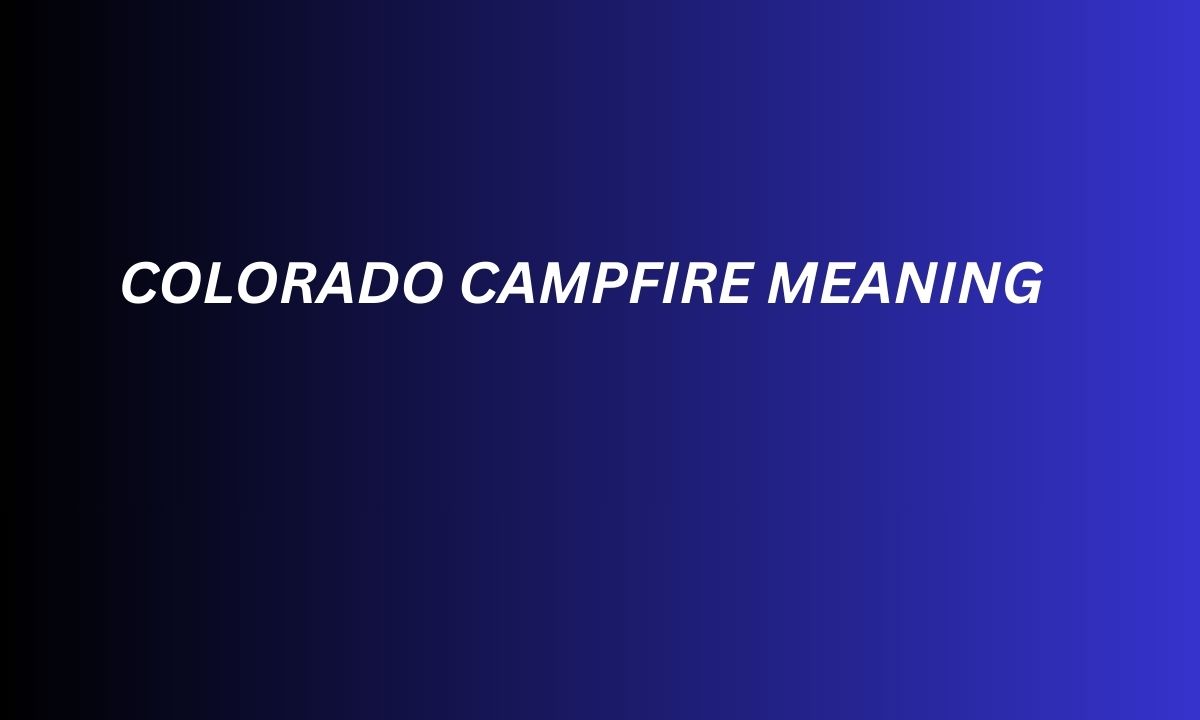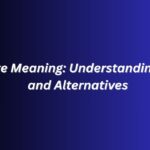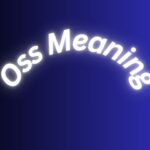Language evolves with culture, and phrases often develop meanings that differ from their literal interpretations. One such example is the expression “Colorado campfire.” This phrase has sparked curiosity, leaving many people to wonder about its origins, connotations, and modern usage.
When people encounter the phrase “Colorado campfire,” they may assume it describes a literal outdoor fire in the state of Colorado. However, in digital communication and slang, the term has taken on alternate layers of meaning that extend beyond its geographical and natural reference.
Understanding the “Colorado campfire meaning” requires examining both its literal and figurative dimensions. It also involves exploring how it is used in conversations, text messages, and online platforms. This article will provide a comprehensive analysis, alongside alternatives and examples, to clarify its nuances.
Colorado Campfire Meaning in Text
The phrase “Colorado campfire” can be interpreted in multiple ways. On the surface, it refers to a simple campfire in the outdoors of Colorado, symbolizing warmth, storytelling, and community. Yet, when used in modern slang or text, it sometimes implies something more figurative.
In certain contexts, “Colorado campfire” is used metaphorically to describe shared experiences, moments of bonding, or even awkward or unusual events. Like many idiomatic expressions, it does not always retain its literal meaning, instead reflecting cultural creativity and humor in communication.
In text messaging, “Colorado campfire meaning” often carries undertones of relaxed, natural conversation or can act as slang shorthand with deeper or hidden implications. For those unfamiliar, its meaning may appear vague or confusing, which is why clarification is necessary.
Exploring the Figurative Meaning of “Colorado Campfire”
Language thrives on imagery, and “Colorado campfire” draws from the rich imagery of outdoor gatherings. A campfire naturally represents warmth, companionship, and storytelling. By adding the geographic identity of Colorado, the phrase captures a rustic and adventurous tone.
When people use “Colorado campfire” figuratively, they may be referring to gatherings that feel genuine, open, or even slightly unconventional. It suggests moments where individuals relax, let their guard down, and exchange thoughts—much like sitting by a fire under the stars.
However, as with many modern phrases, context defines meaning. In some online discussions, “Colorado campfire” has been used humorously, or even ironically, to represent situations that are far from cozy. This duality makes it a fascinating phrase to unpack.
Hiatus Meaning in Relation to “Colorado Campfire”
Before diving deeper, it is worth connecting the concept of a “hiatus” with the interpretation of phrases like “Colorado campfire.” A hiatus generally refers to a pause, break, or interruption. Much like stepping away from daily routine, the imagery of a campfire represents a pause from busyness.
Thus, “Colorado campfire” can sometimes metaphorically align with the idea of a hiatus. Sitting by a campfire suggests taking time away, reflecting, and slowing down. Both concepts intersect around themes of pause, reflection, and shared human connection.
Exploring the meaning of “hiatus” alongside “Colorado campfire” reveals how language interweaves concepts of rest, gathering, and storytelling into memorable phrases that resonate in both casual and professional settings.
Alternatives to the Phrase “Hiatus”
Since part of understanding “Colorado campfire meaning” involves exploring nuances of language, let us look at alternatives to the word “hiatus.” These alternatives vary in tone—some polite, some professional, and others casual.
Instead of a table, the following explanations are written in complete sentences to highlight differences in tone and usage. Each alternative shows how to replace “hiatus” depending on formality and situation.
Polite Alternatives
- Pause – A simple word that conveys stepping back briefly without negative undertones.
- Break – Common and clear, used when explaining short rests from work or activity.
- Time off – Friendly and considerate, showing respect for someone taking rest.
- Respite – A slightly formal term, expressing relief and rest after effort.
- Interlude – Suggests a temporary gap, often used in artistic or formal language.
Professional Alternatives
- Sabbatical – Common in academic or career contexts, signifying extended time off for growth.
- Recess – Often used in official, legal, or educational settings to indicate a break.
- Leave of absence – Formal wording for structured time away from work.
- Intermission – Professional yet artistic, frequently used in performance or event contexts.
- Interval – Neutral and professional, marking a measured period of rest or pause.
Casual Alternatives
- Downtime – Relaxed and informal, often referring to rest after work.
- Breather – Casual and friendly, meaning a short rest.
- Chill time – Modern and youthful, emphasizing relaxation.
- Break time – Common in informal conversation, especially in workplace chats.
- Rest stop – Figurative, playful, and easy to use in casual text.
Each of these alternatives shows how choosing the right expression depends on tone, audience, and purpose. Just as “Colorado campfire” carries layered meaning, so too does the word “hiatus,” depending on its replacement.
How to Choose the Right Alternative
Selecting the right alternative for “hiatus” depends on tone and intention. In a workplace, “leave of absence” or “sabbatical” may be most appropriate. In casual conversation, “breather” or “chill time” feels more natural.
Understanding your audience is crucial. For professional emails, polished terms like “interval” or “interlude” maintain clarity and respect. On the other hand, with friends, informal terms such as “downtime” make the conversation relatable and warm.
The versatility of language allows individuals to express the same core idea in multiple ways, adapting to social and cultural expectations. This adaptability mirrors the flexible and layered interpretation of “Colorado campfire.”
Nuances of Tone in Phrases
Tone dramatically influences how a phrase is received. For example, “respite” feels more elevated and refined, while “breather” is approachable and conversational. Both suggest rest, but the impact on the listener varies.
Similarly, the phrase “Colorado campfire” shifts in meaning depending on tone. Spoken warmly, it evokes imagery of comfort and bonding. Used ironically, it may imply awkwardness or humor. Recognizing these tonal nuances helps speakers use phrases effectively.
Whether writing professionally, conversing casually, or crafting creative text, awareness of tone ensures words carry the right impression and align with the situation’s needs.
The Social Context of “Colorado Campfire”
Language never exists in isolation—it reflects social context. A “Colorado campfire” could literally describe camping traditions in Colorado, where outdoor fires are part of cultural heritage. Yet, in online communities, it often symbolizes togetherness, shared stories, or even inside jokes.
The social environment defines its interpretation. For instance, a group of friends may use it to describe relaxed hangouts, while an online community may assign it a humorous or coded meaning. This demonstrates how language adapts to cultural circles.
Recognizing context prevents misunderstanding. Someone unfamiliar with the phrase may interpret it literally, while those in certain online groups see deeper undertones. Exploring these dimensions provides clarity and cultural awareness.
Examples of “Colorado Campfire” in Sentences
To better understand usage, here are 15 examples where “Colorado campfire meaning” is applied:
- “Last night’s talk felt like a real Colorado campfire—warm and honest.”
- “His message was confusing; I’m still trying to figure out the Colorado campfire meaning behind it.”
- “That meeting turned into a Colorado campfire moment, with everyone sharing stories.”
- “She used the phrase jokingly, but the Colorado campfire meaning wasn’t clear to me.”
- “For us, a Colorado campfire represents more than camping—it means connection.”
- “The discussion turned casual, almost like a Colorado campfire under the stars.”
- “You could sense the Colorado campfire meaning in the way they opened up.”
- “Sometimes, texting feels like decoding a Colorado campfire—hidden and layered.”
- “That movie night was a Colorado campfire experience: cozy, funny, and memorable.”
- “I read his post, but I’m unsure of the Colorado campfire meaning he intended.”
- “The Colorado campfire meaning changes depending on tone and setting.”
- “Our team retreat had a Colorado campfire vibe, making everyone feel included.”
- “She explained it as a metaphor, saying the Colorado campfire meaning was about community.”
- “Not everyone understands the slang, but Colorado campfire meaning spreads online quickly.”
- “He used Colorado campfire meaning to describe a pause, like taking a hiatus.”
These examples show how flexible and context-driven the phrase is, ranging from literal interpretations to symbolic and humorous applications.
Conclusion
The phrase “Colorado campfire meaning” illustrates how language blends literal imagery with metaphorical layers. Rooted in the warmth and storytelling of campfires, it adapts into digital slang, online humor, and even symbolic associations with hiatus and reflection.
By understanding tone, context, and cultural usage, one can apply “Colorado campfire” effectively in conversation. Just as alternatives to “hiatus” change based on formality, the interpretation of “Colorado campfire” depends on audience and intention.
Exploring phrases like this deepens appreciation for how language evolves, how words shape social meaning, and how expressions create connections across both professional and casual settings.

Elizabeth crafts heartfelt messages for every occasion—anniversary wishes, love notes, prayers, thank-yous, and inspirational greetings—bringing warmth, joy, and connection to your special moments.










